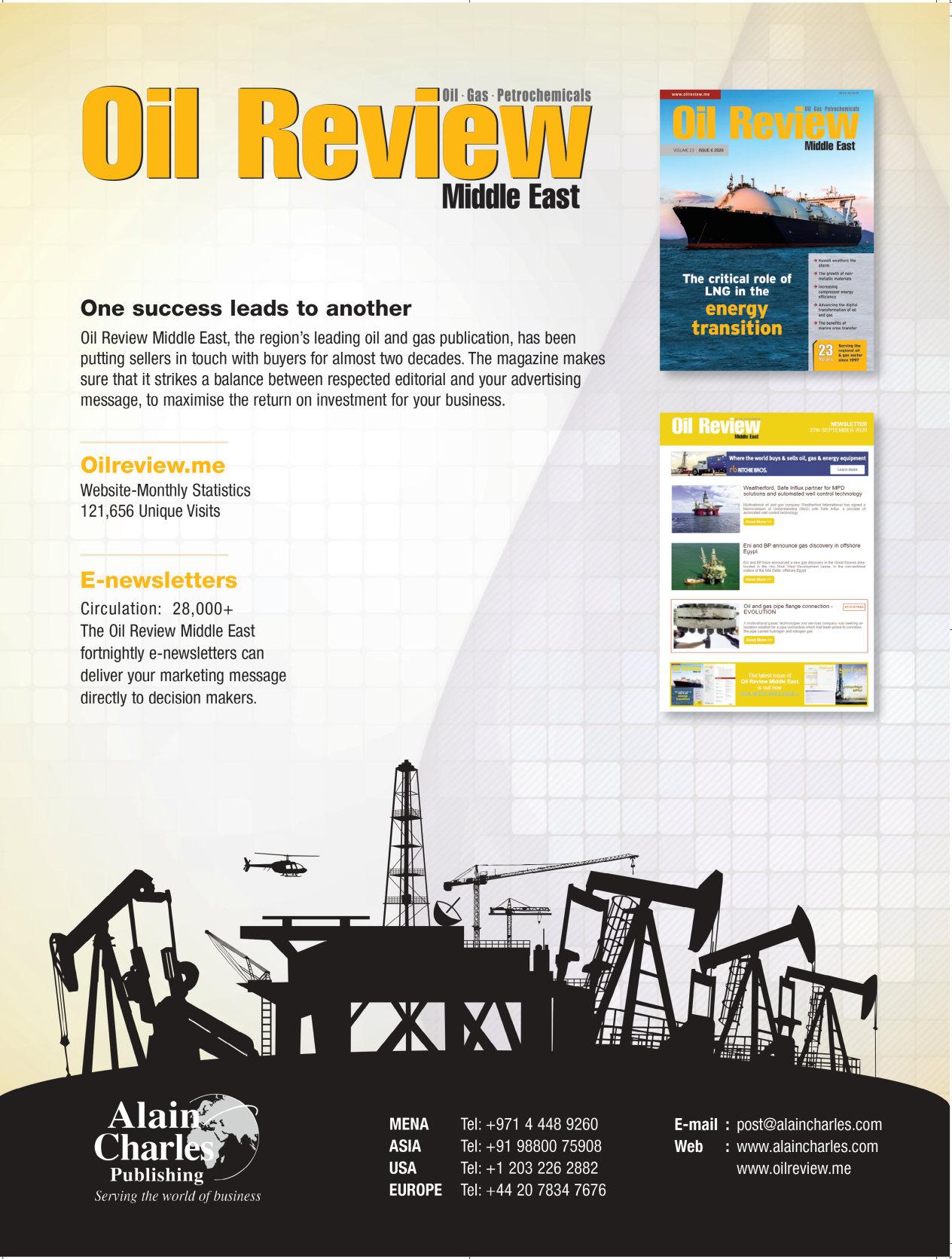
8 minute read
COMMUNICATIONS & IT
The power of storage in Industry 4.0
At the core of the digital transformation is data and is the need to secure and analyse this data to gain business insights. How data storage is becoming crucial for transportation, power and manufacturing sectors?
The GCC and Levant’s data storage market is set to reach a record‐high of US$8.5bn by 2027.
2020 HAS BEEN a year of unprecedented change for businesses globally and in the region. The onset of the pandemic brought with it the pressing need to accelerate digital transformation, especially to enable remote working across sectors. In a matter of days, companies had to upgrade their legacy infrastructure and equip employees to operate from anywhere.
At the core of this transformation is data and the need to secure and analyse this data to gain business insights. In fact, according to the forecasts by Global DataSphere, data is expected to grow to 175 zettabytes by 2025 driven by investments in new emerging technologies. As we enter the data decade, enterprise data storage has become critical. According to a recent report from Coherent Market Insights, the GCC and Levant’s data storage market is set to reach a recordhigh of US$8.5bn by 2027, nearly tripling from US$2.9bn in 2019.
In data storage – which touches every ITdriven business – the pace of innovation is accelerating, yet most enterprises continue to struggle with data’s explosive growth and velocity. Getting the highest use and value from their data is becoming ever more critical for organisations, especially for those with data stores reaching exabyte scale.
Transportation, power and manufacturing
There are three major industries that often go unnoticed in discussions around enterprise storage – namely transportation, power and manufacturing. In the highlycompetitive transportation industry, speed and differentiation are the key. A wide range of organisations, from suppliers to mobility providers, are scaling infrastructures at the edge, bringing vehicles and intelligence closer. They are also scaling at the core and cloud to handle exponential data growth with agility. Challenges such as enabling autonomous vehicles to drive is incredibly data and compute intensive. The ability to achieve feats like this requires an agile, integrated, softwaredefined infrastructure enabled by purposebuilt storage solutions for automotive workflows. A case in point would be the racing industry which went far and beyond. With data analytics at the edge and core, data insights are used to develop and update more than 150,000 parts in a
racing car to achieve better performance.
Next is the manufacturing sector that continues to be powered by technology. From integration to automation, tech is helping companies innovate faster and make things smarter and more efficient every day. Industrial progress has been at the centre of human advancement for centuries and data is driving the rise of Industry 4.0. Companies in this sector are increasingly seeking versatile, performancecentric storage solutions built for operational simpli city and agility, and managing a distributed process across geographies with proper scaling and connectivity.
Finally, the energy and utilities sector continues to evolve powered by storage technologies. To move forward their digital transformation, energy companies are getting deeper deployments on the digital oil field. With the use of cloudlike realisation of diverse data models that allows better cross insights throughout the globe, utility companies are deploying edge and IoT devices to manage and monitor electricity at a higher level of granularity than in the past. Importantly, they also need a modern distributed storage architecture and analytics capabilities to store and analyse the data collected. This will deliver real time insights that meet changing business demands, while delivering actionable intelligence.
With the need for a revolutionary and agile infrastructure that can adopt to applications models, from being scaleup performance intensive to cloud native applications that are aiming at creating data at edge, core and cloud is a major functionality that customers need to look for. As there is no onesizefitsall, the emergence of multiple storage
DIGITAL DEWA – THE digital arm of Dubai
Electricity and Water Authority (DEWA), has announced a strategic partnership with
Group 42 (G42), an Abu Dhabi based leading Artificial Intelligence (AI) and cloud computing company.
The partnership with Group 42 enables
Digital DEWA companies – Moro Hub,
InfraX and DigitalX – to introduce and implement digital and data transformation initiatives. It aims to foster new services around AI and enhance innovations across
Digital DEWA’s service portfolio.
Commenting on the collaboration,
Saeed Mohammed Al Tayer, MD and CEO of DEWA, said, “The partnership with G42
Photo Credit: Dell Technologies

Ossama El Samadoni, senior sales director – Middle East, Russia, Turkey, and Africa (MERAT), Dell Technologies
technologies is underway. Focus is placed on how we can manage such diverse technologies under a single pane of glass that allows data management and applications servicing regardless of where the application is or what the application technologies being used are. We are proud of our development so far and what we continue to do to provide the infrastructure medium for such transformations to be successful and productive.
Data security strategy
But with this explosion of data comes considerable threats. With data security becoming an important point of discussion, will strengthen Digital DEWA offerings, as they can now extensively collaborate on technological endeavours, to cocreate services in the clean energy and IoT, leverage AIled solutions for government entities and enterprises across different sectors as well as explore the commercial and operational feasibility of such opportunities.”
The new services will be hosted on Moro Hub and G42 cloud infrastructure to ensure data security and superior customer experience. The services will be managed in Moro Hub’s Smart Cities Command and Control Centre, offering 24/7 support to future clients. the question is not if the data is at risk of being breached, but when. Security adoption is not happening at the same rate as risks are increasing, and with over 350,000 new threats identified each day, it is vital for businesses to understand the evolving threat landscape, what can be done to ward off threats, and what’s next in cybersecurity.
From human error to attacks beneath the OS, corporate data breaches are on the rise as hackers continue to remain one step ahead. By continuously evolving their tactics to compromise systems and endpoints, organisations need to engage a strong defense strategy by prioritising security from the onset. It is vital to have the framework and technologies to provide security at the edge and on the storage itself, manage the risk in terms of data resiliency, and finally doing that in a consistent manageable manner. The way forward for organisations is to create an enterprisewide data strategy that meets the needs of everyone but still maintains the strengths of each functional area.
Going ahead
As we look at technology requirements today and beyond 2020, one thing is clear. Storage will be architected and consumed as softwaredefined and the lines between storage and compute will continue to blur, as organisations demand unparalleled agility and simplicity for businesscritical IT infrastructure to respond effectively to rapidly changing market dynamics. ■
– By Ossama El Samadoni, senior sales director – Middle East, Russia, Turkey, and
Digital DEWA partners with Group 42 to boost AI and cloud innovation
Africa (MERAT), Dell Technologies
“We are also committed to trengthening the UAE's position as a global hub for the Fourth Industrial Revolution and increase its contribution to a knowledgebased national economy that depends on innovation and future technological applications,” said Saeed Mohammed Al Tayer.
At the signing ceremony, Peng Xiao, CEO of Group 42, commented, “Our expertise in the fields of AI, Big Data Analytics and cloud computing, combined with our specialised industrial knowhow, allow us to develop progressive and holistic solutions to problems in every sector, empowering businesses to transition to digital environments effortlessly.”
Project Databank
Compiled by Data Media Systems
Project Focus
Compiled by Data Media Systems
Project Summary
Name of Client
Estimated Budget ($ US)
Facility Type
Sector
Status
Location
Project Start
End Date
Last Updated
RESRECO - Al Reef Sugar Refinery Company (JSC)
400,000,000
Food Processing Plant
Industrial
Construction
Jizan, Saudi Arabia
Q1-2012
Q1-2021
01-09-2020
FEED
Main Contractor
Contract Value ($ US)
Award Date
AK Saeed Group
AK Saeed Group
300,000,000
Q1-2015
Background
Al Reef Sugar Refinery is located in Jizan, Southwest of Saudi Arabia and will initially refine raw imported sugar. The scheme is looking to capitalize on the low energy costs and the advantages of its Red Sea location.
Project Scope
The project scope includes:
• Development of a refinery with an annual production capacity of 1,000,000 tonnes of refined sugar in Jazan economic city • Two raw sugar storage with each having 150000-tonne capacity • Process building: 5000 sq metre with 4 floors • Three conditioning silos of 3000-tonnes each • Conditioning and dedusting building • White sugar packing and storage station • Workshop and chemical storage • Flue Gas Desulfurization (FGD) station • A 14-megawatt (MW) power plant • 2 fuel tanks of 3000 cubic metres • 2 molasses tanks of 3000 cubic metres • Seawater desalination plant with capacity of 250 cubic metres per hour
Project Status
Date
Aug 2020
Jan 2020
Status
Biomass Industries Associates (BIA) continues to provide geo technical engineering with ongoing sheet piling and installation work. Various machinery from Hyundai Construction Equipment are being used on site.
Construction of the Al Reef Sugar Refinery buildings and the steel work are nearing completion. The first sugar silo is already in place.











